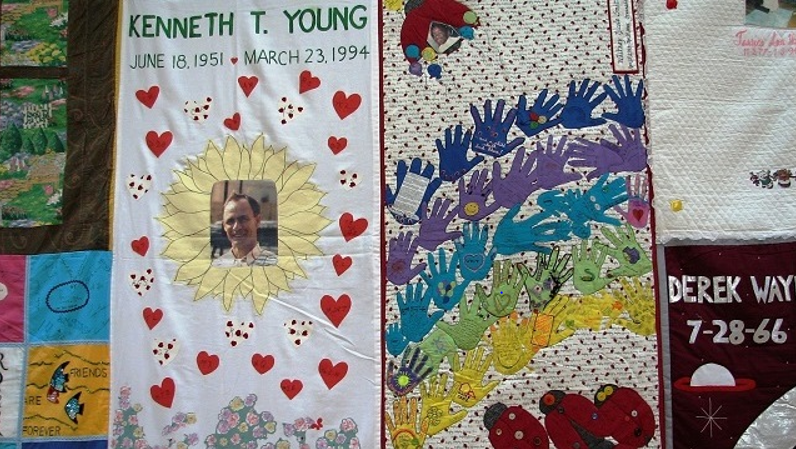
By Marti Webb Slay
Alabama NewsCenter

After Jan Conway’s son Michael died from AIDS in 1988, she and her daughters memorialized him with a block in the AIDS Memorial Quilt.
“When I see my son’s panel, it’s almost like I see him again,” said Conway, administrative assistant at Woodlawn United Methodist Church. “It’s very difficult to put into words what this quilt represents. I want to run and kiss it and kiss him. It’s an extremely emotional thing.”
Eight panels of the AIDS quilt are hanging at Woodlawn UMC this week for public viewing, and Michael’s block is in one of them.
That’s why Emily Freeman Penfield, pastor of Woodlawn UMC, refers to the quilt as a sacred piece of art. “Each block represents a loved one,” she said.
The Conway family gave Michael’s panel to the NAMES Project Foundation, custodian of the quilt, in 1991 in a special ceremony at the Birmingham-Jefferson Convention Complex. “It was almost like a royal court,” Conway said. “We walked up with the block and bowed before handing it to them. They treat these panels with a lot of respect.”
Conway’s block contains his name, birth and death years, and an embroidered poem written by a friend. Another block is as simple as a first name and drop of blood. Others are far more involved, with memorabilia attached that reflect an entire lifetime. Each block is unique, as is the person it represents.
Ministering to all
The panels contain eight blocks, so the panels on display this week represent 64 people who have died from AIDS. The quilt, which was started in 1987 to remember and honor the lives of friends, partners and loved ones lost to AIDS/HIV, was last on display in Birmingham about 10 years ago, when Birmingham AIDS Outreach (BAO) sponsored it as part of its recognition for World AIDS Day. Donations to BAO can be made at the display, which is free to the public.
“BAO continues to feed and clothe and provide medical care to people with HIV/AIDS,” said Freeman Penfield. “They have a wonderful pets program to provide companions for patients and do so many amazing things. As a church, we have tried to be a friend and supporter.
“AIDS/HIV is often associated with the LGBTQ community, ethnic minorities and people with drug addictions,” she continued. “Those are people who have, to a large degree, been excluded from the church for so long. Many still are. Sponsoring this display is an opportunity for this church to say we are compassionate and want to minister to everyone.”
Woodlawn UMC is part of the Reconciling Ministries Network, “United Methodist individuals, congregations, campus ministries and other groups working for the full participation of all people in the United Methodist Church,” according to the church website.
Freeman Penfield praised those who have sacrificed for AIDS/HIV patients over the years. “AIDS doesn’t just affect the person who is sick,” she said. “It affects the caregivers, family members and friends – an entire community. Sponsoring this display is a way to honor all of them.”
The sanctuary will be open for people who wish to light a candle in honor of loved ones, and a blank panel sits in the middle of the display room for attendees to write their thoughts, wishes and responses after the viewing.
96,000 names
The NAMES Project is a nonprofit organization that uses the quilt “to foster healing, heighten awareness and inspire action in the struggle against HIV and AIDS.” Organizations interested in displaying the quilt pay an honorarium for each eight-block panel and must meet requirements to properly display the panels in order to protect them.
Blocks continue to arrive at the NAMES Project throughout the year. The AIDS Memorial Quilt now includes more than 49,000 panels dedicated to more than 96,000 individuals, and it weighs more than 54 tons. If each individual panel were laid end to end, they would stretch 50 miles. It has been displayed in its entirety only in Washington, D.C. – the last time in 2012. According to the NAMES Project, the quilt is the largest piece of community art in the world.
But for those who have made blocks for their loved ones, it is more memorial than art, and it presents an opportunity to increase awareness as they remember those they have lost.
“We encourage people to come see the quilt, just as you would go to a museum for civil rights or the Holocaust to remember suffering and be a part of alleviating that suffering,” Freeman Penfield said. “We still have work to do: prevention, education, medication and finding a cure. This is Pride Week. Come remember with us.”
AIDS Memorial Quilt
Woodlawn United Methodist Church
139 54th St. North
Birmingham
June 5-9, 5 p.m. to 8:30 p.m.
June 10, 10 a.m. to 3 p.m.
Free admission, but donations can be made to Birmingham AIDS Outreach




